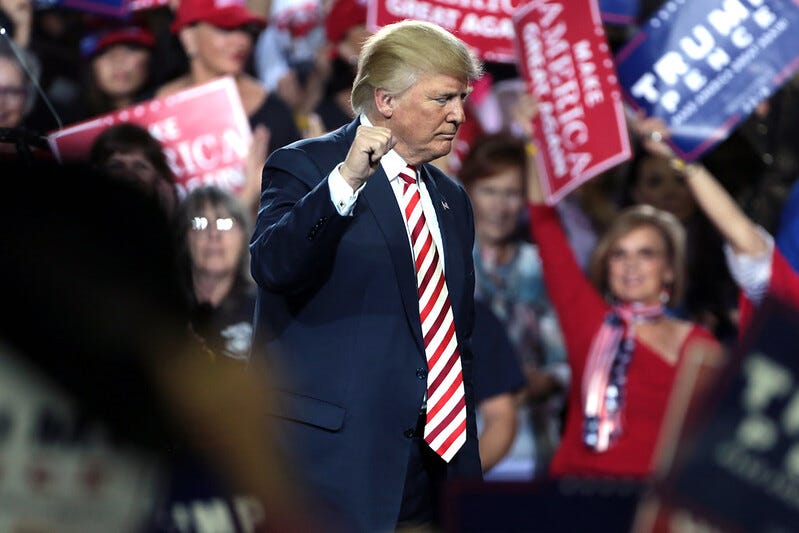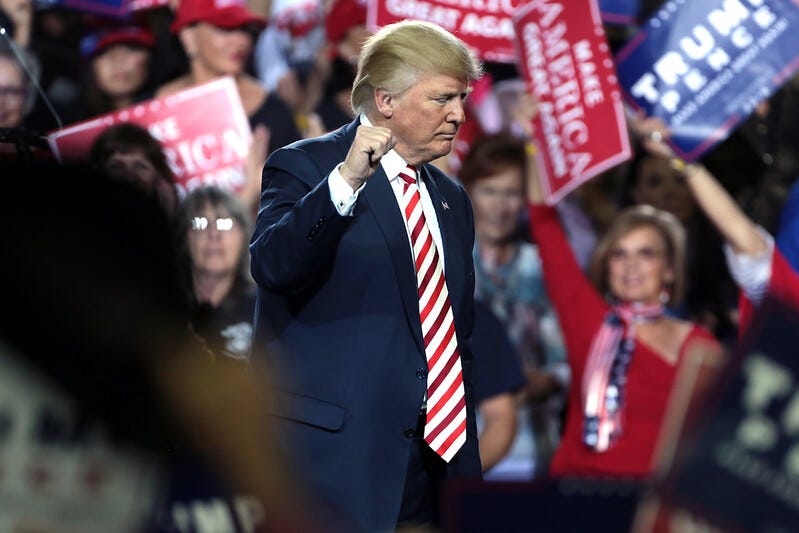Wake Up To Politics - January 13, 2022
Wake Up To Politics: The GOP’s shadow 2024 primary
by Gabe Fleisher
Good morning! It’s Thursday, January 13, 2022. Election Day 2022 is 299 days away. Election Day 2024 is 1,027 days away.
The GOP’s 2024 shadow primary
To kick things off today, let’s take a look at the latest developments in the shadowboxing among Republicans in advance of the party’s presidential primaries in 2024.
The most interesting change to emerge in the past few days? Former President Donald Trump appears to be turning on Gov. Ron DeSantis (R-FL), his onetime ally.
In an interview with One America News on Wednesday, Trump seemingly went after DeSantis for the governor’s refusal to acknowledge whether he received the Covid-19 booster shot.
“I watched a couple politicians be interviewed and one of the questions was, ‘Did you get a booster?’ Because they had the vaccine and they’re answering like — in other words, the answer is ‘yes,’ but they don't want to say it, because they’re gutless,” the ex-president said.
The comments were part of a broader shift by Trump in recent weeks towards more pro-vaccine rhetoric, including at an event last month where he was booed by some of his supporters after revealing he received his booster shot. (In contrast to his original vaccine dose, which he did not acknowledge receiving while president and was instead reported by the New York Times after he left office.)
But make no mistake: the choice to needle DeSantis has “2024” written all over it. Back in 2018, Trump’s decision to endorse DeSantis lifted the then-congressman to a come-from-behind victory in the Florida GOP gubernatorial primary. But Trump has reportedly grown suspicious of the governor; per Times reporter Maggie Haberman, he is upset DeSantis won’t say “the magic words,” which are a promise not to seek the presidency in 2024 if Trump also runs.
According to (very) early polls of the 2024 primary, DeSantis would be Trump’s leading rival for the GOP nod, although the former president regularly runs far ahead of the governor. In a recent Reuters/Ipsos poll, for example, DeSantis was in second place behind Trump — but it was a distant second, taking 11% support to Trump’s 54%.
Trump’s comments to One America News this week seem to be an early attack against DeSantis ahead of a possible primary contest; they also serve as another interesting sign that the former president may aim to separate himself from DeSantis and other potential GOP rivals by firmly endorsing the Covid vaccines.
Meanwhile, there are some signs that Trump’s influence over congressional Republicans is fraying — if only slightly. Sen. Mike Rounds (R-SD) broke with Trump in an ABC News interview last weekend, debunking the former president’s lies about the 2020 election being stolen from him.
“As a part of our due diligence, we looked at over 60 different accusations made in multiple states,” Rounds said. “While there were some irregularities, there were none of the irregularities which would have risen to the point where they would have changed the vote outcome in a single state.”

Trump soon unleashed an attack against Rounds, but Senate Republicans have mostly sided with the South Dakotan: Senate Minority Leader Mitch McConnell (R-KY), for one, said that Rounds “told the truth about what happened in the 2020 election” and that he agrees with him. Republicans have similarly declined to join in on Trump’s attacks against McConnell, another sign of the limits to his influence.
(One exception: Sen. Lindsey Graham (R-SC), perhaps Trump’s closest ally in the Senate, said on Fox News last night that he would only support McConnell continuing as leader if the Kentuckian shows he can “effectively work with the leader of the Republican Party, Donald Trump.”)
Trump’s moves against DeSantis, McConnell, and other leading Republicans come as Trump has sought to re-assert himself in the political conversation. The former president will hold his first rally of the year in Arizona on Saturday — joined by a slate of candidates who have trumpeted his lies about the 2020 election.
He also made a rare foray out of his right-wing media bubble this week, granting an interview to NPR. During the interview, Trump reiterated his support for vaccines (“I recommend taking them,” he said) but when host Steve Inskeep tried to press the former president on his baselss claims of election fraud, Trump abruptly called an end to the Q&A.
What else you should know
→ Voting rights. As you’ll see in “Daybook,” President Biden heads to the Capitol today to urge Senate Democrats to weaken the filibuster to allow voting rights legislation to pass. Despite furious lobbying by Biden and other top Democrats — including a new op-ed by former President Barack Obama, his first since leaving office — there are no indications that Sens. Joe Manchin (D-WV) and Kyrsten Sinema (D-AZ) have shifted in their opposition to modifying the filibuster on a partisan basis.
The House will vote today to pass a bill combining the Democrats’ two voting rights proposals, setting up the Senate to consider the measure — and possible rule changes — in the coming days. Meanwhile, congressional Republicans have stepped up their criticism of the Democratic voting rights push: Senate Minority Leader Mitch McConnell (R-KY) called Biden’s recent speech on the issue “beneath his office” and “profoundly unpresidential.”
→ January 6 committee. House Minority Leader Kevin McCarthy (R-CA) refused a request for an interview from the House committee investigating the January 6 attack on Wednesday, hours after the panel asked for one. “The committee’s only objective is to attempt to damage its political opponents,” McCarthy said in a statement announcing his refusal to cooperate.

McCarthy was in close contact with former President Donald Trump during the Capitol attack, including an expletive-laced phone call in which he reportedly urged Trump to call off the rioters. “Well, Kevin, I guess these people are more upset about the election than you are,” Trump said to McCarthy in response, according to CNN.
→ Coronavirus. Building off of Wednesday’s newsletter on the Biden administration Covid response: as of yesterday, the FiveThirtyEight polling average now shows more Americans disapprove of Biden’s handling of Covid than approve of it, the first time that has happened since he took office. (h/t Nathaniel Rakich)
Policy Briefing: Legal
Every Thursday, Wake Up To Politics contributor Anna Salvatore offers a briefing on the week’s top legal news:
Earlier this week, a federal lawsuit accused sixteen of the nation’s most prestigious private universities of colluding to artificially lower financial aid awards. Five former undergraduates filed the suit, claiming that institutions including Yale, Columbia, Georgetown, and Duke have over-charged an estimated 170,000 students. According to the New York Times, universities can only cooperate to write financial aid formulas if their admissions departments are need-blind, meaning that they do not consider applicants’ ability to pay. This rule is encoded in federal antitrust law.
The new lawsuit alleges, though, that the accused universities do consider applicants’ ability to pay by favoring the children of major donors. “Privileging the wealthy and disadvantaging the financially needy are inextricably linked,” the suit asserts. “They are two sides of the same coin.”
The Supreme Court heard oral arguments on Tuesday about when immigrant detainees are entitled to bail hearings. The dispute began when Antonio Arteaga-Martínez, a Mexican citizen, was arrested in 2018 for entering the U.S. unlawfully. After he was detained for four months without receiving a deportation hearing, he sued the government, arguing that he deserved the chance for an immigration judge to promptly review his case.
The justices disagreed on how soon he was entitled to the hearing, a question which could affect thousands of other cases amid a nationwide backlog in immigration courts. While the liberal-leaning justices were inclined to affirm his right to a speedy hearing, their conservative colleagues were skeptical that federal law should “be expanded beyond its plain terms” to require those hearings before six months.
As the Supreme Court contemplates overturning Roe v. Wade, some state legislators fear that same-sex marriage could be the next target. As a result, New Jersey passed a law on Monday enshrining same-sex marriage as a state right. “We’ve been fighting for marriage equality for decades, and to turn back the clock would be devastating,” Assemblywoman Valerie Vainieri Huttle, who co-sponsored the new bill, told NBC News. Two West Virginia lawmakers will introduce a similar bill this month.
“We just all have to be careful,” said LGBT advocate Mary Bonauto, “to avoid giving credence to the idea that reversing Obergefell is inevitable,” referring to the Supreme Court decision protecting same-sex marraige, adding that “we are not expecting this.”
More legal headlines, via Anna:
The Supreme Court declined to hear the appeal of an Alabama woman who left the U.S. to join ISIS, but now regrets her decision and wants to return home.
In a class-action lawsuit filed in Puerto Rico, minor league baseball players are accusing all thirty MLB franchises of conspiring to artificially suppress their salaries.
Daybook
All times Eastern.
→ President Joe Biden will receive his daily intelligence briefing at 9:30 a.m. Then, at 10:30 a.m., he will deliver remarks offering an update on his administration’s response to Covid-19. Defense Secretary Lloyd Austin and FEMA Administrator Deanne Criswell will also be in attendance.
Finally, at 1 p.m., Biden will go to the U.S. Capitol to meet with the Senate Democratic Caucus and urge them to pass voting rights legislation by weakening the filibuster.
→ White House Press Secretary Jen Psaki will hold her daily press briefing at 3 p.m. National Security Advisor Jake Sullivan will also participate.
→ The Senate will convene at 10 a.m. and begin consideration of S.3436, the “Protecting Europe’s Energy Security Implementation Act,” which would sanction European officials involved with the construction and operation of Nord Stream 2, a gas pipeline that is slated to go from Russia to Germany.
The bill was written by Sen. Ted Cruz (R-TX); it is being considered by the Senate as part of an agreement with Senate Majority Leader Chuck Schumer (D-NY) in which Cruz agreed to lift his holds on 32 nominees awaiting confirmation. The Biden administration is lobbying Democrats to oppose the measure, instead throwing its support behind an alternative bill that would only impose sanctions on the pipeline if Russia escalates hostilities with Ukraine.
The Senate will recess from 12:45 p.m. to 2:15 p.m., while the Democratic caucus meets to hear from President Biden. At 2:15 p.m., the Senate will hold up to 30 minutes of debate on S.3436, followed by a vote on passage of the bill at 2:45 p.m. Under the terms of the Schumer-Cruz deal, the bill will require 60 votes to pass.
→ The House will convene at 9 a.m. and consider H.R. 5746, which was originally a NASA bill but has been amended to contain the provisions of the two Democratic election reform and voting rights proposals.
Now titled the “Freedom to Vote: John R. Lewis Act,” the measure is being used as a vehicle for the voting rights bills to originate in the House, which will allow it to bypass an initial procedural vote when it arrives in the Senate. (60 votes are not needed on a “motion to proceed” vote to begin debate on a bill that was sent from the House; under current Senate rules, 60 votes would still be needed to cut off debate on the measure.)
The House will hold an hour of debate on the 735-page voting rights bill, followed by a vote on its passage.
→ The Supreme Court will release one or more opinions in pending cases at 10 a.m.





